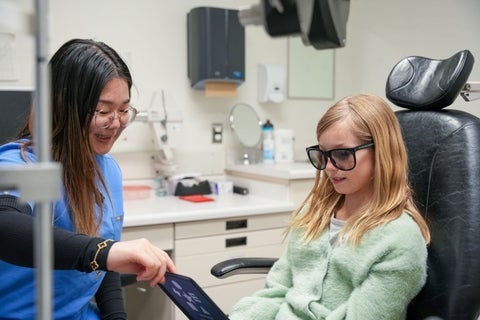
Vision therapy trains the eyes and brain to work together better. At the Waterloo Eye Institute, vision therapy is provided by the Binocular Vision Service of the George & Judy Woo Centre for Sight Enhancement.
Binocular vision dysfunction is at the heart of most conditions that may be improved through vision therapy. Binocular vision is the ability for our brain to combine the two images seen by each of our eyes into a single image that is clear, comfortable and has depth.
Vision therapy is like a strength and conditioning program for the visual system. The goal is to teach your eyes and brain to work together so you can have more control over your visual environment and function well. Vision therapy may benefit people with some types of acquired brain injuries. Sometimes sports performance can also be enhanced through vision therapy.
Vision therapy consists of a series of regular visits where a patient is guided to do individually tailored activities, which might include focusing on moving objects, using different prisms or lenses to look at targets, looking at materials at different distances from the eye and even playing games with specific visual components. As patients progress, activities get more challenging.
The vision therapist will also explain how patients can practice these activities at home. Regular practice is a crucial component of vision therapy.
Frequently asked questions
Q. Who can refer me or my child to vision therapy?
Health-care providers, such as child psychologists, physiotherapists, family doctors and other optometrists, may refer patients to vision therapy. Within the Waterloo Eye Institute, patients may be referred following a comprehensive eye exam. Patients can also refer themselves or their children, provided they have had a comprehensive eye exam within the last year. If you believe you or your child may benefit from vision therapy, please call us for an assessment.
Q. What types of conditions can be treated with vision therapy?
An extensive binocular vision assessment is needed to determine whether vision therapy may be warranted. Conditions where a patient may benefit from vision therapy include:
- Amblyopia (lazy eye)
- Strabismus (eye turn)
- Double vision
- Frequent headaches or eye strain, especially with reading or close work
- Difficulty learning to read for visual reasons
- Frequent dizziness or motion sickness
- Difficulty with depth perception
- Concussion with lingering visual symptoms
- Stroke with lingering visual symptoms
Q. What will I have to do at home?
Your optometrist will show you the activities you should do at home, for how long and how often. Often, you will be asked to purchase some equipment. This typically costs about $50-$100 over a full course of treatment, though it may be more if a patient plans to do more of their vision therapy at home (i.e. because they live far from the clinic and are attending less often).
Q. How will I know if vision therapy is working?
At the Waterloo Eye Institute, our vision therapy is evidence-based and tailored to your specific needs and goals. We start with a full binocular vision assessment to determine whether vision therapy is likely to improve your condition. Progress assessments are performed every five to eight sessions to evaluate your current status and future goals. We also check in during every session to ask if anything has changed or if you’re having any issues with your at-home exercises.
Q. How long will vision therapy take?
This depends on what condition you have and its severity, as well as other factors such as your age, how often you attend vision therapy sessions and how much you practice at home. Most of our patients are enrolled for four to 12 months, with the average being six to eight months.
Q. What sort of outcome can I expect?
This also depends on the factors listed above. Some conditions are easier to improve than others. Children with binocular vision dysfunction but no brain injury are more likely to reach a point where their vision is indistinguishable from peers with normal vision.
Some patients, particularly those with strokes or other brain injuries, may never reach full resolution, but significant improvements to quality of life can still be made. For example, you may be able to go from being able to read for five minutes to being able to read for hours. You may be able to return to work using a computer, even if you still need breaks. You may be able to enjoy social activities without getting a headache or vertigo. You may be able to drive more comfortably again.
Q. Is vision therapy covered under OHIP?
Vision therapy is not covered under the Ontario Health Insurance Plan. Neither are binocular vision assessments or follow-ups. Some private insurance plans may cover or partially cover vision therapy (this may fall under the umbrella of physiotherapy or occupational therapy). We are happy to provide documentation to your insurance provider. As of 2025, vision therapy appointments are $100 a session at the Waterloo Eye Institute. A full assessment through our Binocular Vision Service costs $220. If applicable, you may instead do a full assessment through our Brain Injury Service, which costs $240. All fees are subject to change.
Contact
Vision therapy appointments are at our Waterloo Clinic. To make an appointment, call 519-888-4567, ext. 32395 or email binocular.vision@uwaterloo.ca.
Address: Unit C, 419 Phillip St., Waterloo